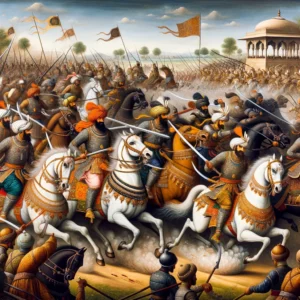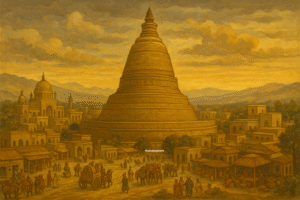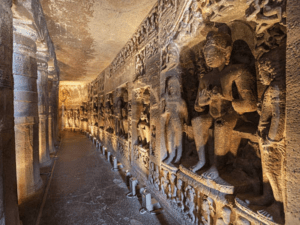Motihari is a historically significant city located in the East Champaran district of the Indian state of Bihar. Here’s a detailed overview of its history from ancient times to the present:
Key Figures and Events:
- Mahatma Gandhi: His involvement in the Champaran Satyagraha is a pivotal event in Motihari’s history.
- George Orwell: Born in Motihari, Orwell’s literary legacy adds to the city’s cultural significance.
- Champaran Satyagraha (1917): The movement led by Gandhi in Champaran district, including Motihari, played a crucial role in India’s struggle for independence.
Ancient History
The ancient history of Motihari is not extensively documented, but the region of Bihar has a rich historical legacy dating back to ancient India. The fertile plains of Bihar have been inhabited since prehistoric times, with evidence of Neolithic and Chalcolithic settlements.
The Maurya Empire, under the reign of Emperor Ashoka (3rd century BCE), had a significant presence in Bihar, and the region prospered as a center of trade and culture during this period.
The Legends of Moti Singh and Hari Singh:
Legend has it that Motihari owes its name to two illustrious figures: Moti Singh and Hari Singh. While their historical identities remain veiled in obscurity, their names resonate in local folklore, symbolizing the town’s rich legacy and enduring spirit.
Medieval Period:
Bihar witnessed the rule of various dynasties during the medieval period, including the Gupta Empire, the Pala Dynasty, and the Sena Dynasty. These dynasties contributed to the development of art, culture, and education in the region.
Motihari, being part of Bihar, likely experienced the influence of these dynasties, although specific details may not be available.
Colonial Era

Champaran Satyagraha:
Motihari gained prominence during the British colonial period. It became known as the site of Mahatma Gandhi’s first experiment with Satyagraha (nonviolent resistance) in India. In 1917, Gandhi launched the Champaran Satyagraha, a movement against the oppressive indigo plantation system imposed by British landlords in Champaran district, which includes Motihari.

The Champaran Satyagraha marked a significant turning point in India’s struggle for independence, and Motihari became a symbol of resistance against British colonial rule. This event also brought attention to the issues faced by Indian peasants and catalyzed the Indian freedom movement.
George Orwell’s Legacy:
Motihari is also known as the birthplace of the renowned Indian author, George Orwell (pen name of Eric Arthur Blair), who was born here in 1903. Orwell’s experiences in Motihari during his father’s service as an opium agent influenced his literary works, including his famous novel “1984.”
Modern Era:
After India gained independence in 1947, Motihari continued to be an important center in Bihar. It has seen development in various sectors, including agriculture, education, and infrastructure.
Today, Motihari remains an important town in Bihar, with a mix of historical significance, cultural heritage, and modern development. Its contributions to India’s freedom struggle and literary heritage continue to be remembered and celebrated.






